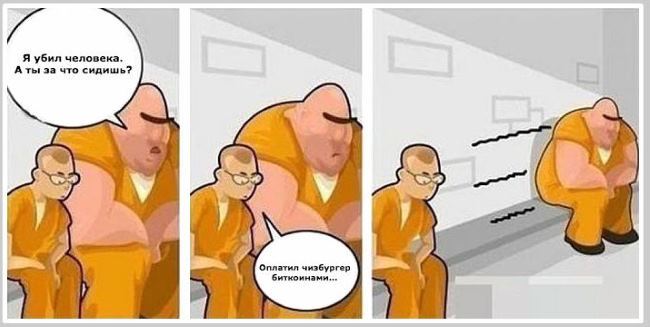The Ministry of Finance proposes to punish for operations with bitcoins with imprisonment for up to 7 years

Bitcoin in Russia is considered a cash surrogate. Back in October last year, the Ministry of Finance proposed punishing the use of
Now the Ministry of Finance has prepared even tougher amendments to the Criminal Code, proposing to punish the release of monetary surrogates by imprisonment for up to 4 years, Interfax reports. Moreover, 4 years is for ordinary mortals; top managers of banks and financial companies may well receive a sentence in 7 years of imprisonment.
A year ago, it was proposed to establish the maximum penalty for the manufacture (issue) of an acquisition for the purpose of sales, as well as the sale of money substitutes - one year of correctional work (for organized groups - two years).
')
Now, for the same actions, the perpetrator can be punished with a fine of up to 500 thousand rubles (or other income of the convicted person for a period of up to three years) or imprisonment for up to 4 years. An organized group can receive a fine from 500 thousand to 1 million rubles or imprisonment for up to 6 years.
Top managers of financial organizations for the same actions can be punished much more severely. Such convicts face fines ranging from 1 million to 2.5 million rubles or imprisonment with the deprivation of the right to hold certain positions.
According to the agency, the use of money substitutes "creates the prerequisites for the involvement of citizens and legal entities in illegal activities, including the laundering of criminal proceeds." And since virtual cryptocurrencies that have become widespread in recent years do not have a single center for working with transactions, and these are anonymous systems, this makes virtual money an attractive means for criminals, they believe in the government.
Russia is now the fifth in the world in popularity of the use of cryptocurrency. The Ministry of Finance, the Investigation Committee , the Central Bank and other departments and organizations simultaneously oppose such systems. According to the head of the Investigative Committee of Russia Alexander Bastrykin, the turnover of the so-called monetary surrogates in the Russian Federation currently reaches about 1% of GDP. If the percentage increases to 10% or more, then "this tool will pose a real threat to the financial stability of the state." And this, according to Bastrykin, is already fraught with the fact that "the state may lose its monopoly on the issue of money and income from this activity."
There are in the Russian Federation and supporters of working with cryptocurrencies. For example, the head of Sberbank, German Gref, stated that cryptocurrency in Russia should not be prohibited.
Source: https://habr.com/ru/post/391587/
All Articles